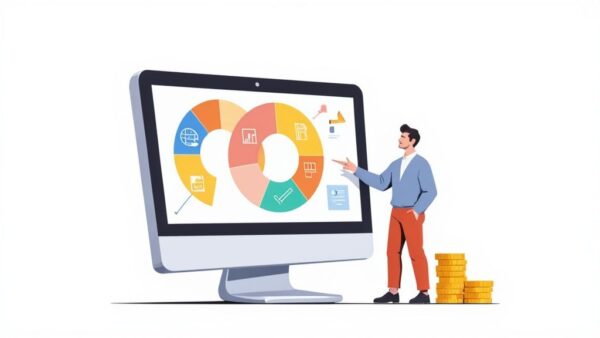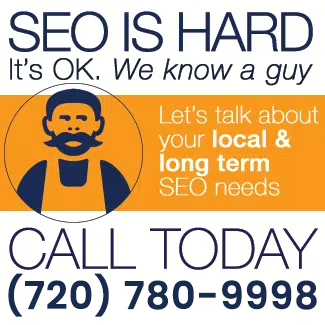Here’s something that might surprise you: 27% of small businesses still don’t have a website. If you’re trying to figure out what a website costs, you’re probably getting wildly different numbers from every source you check.
Ready to Build Something That Actually Works?
The Affordable Web Guy helps small businesses create websites that don’t just look good—they work hard to bring in customers. Let’s talk about your project and get you set up with an online presence that earns its keep.
Why Your Website Never Takes a Day Off
Think about it this way—your website is like having an employee who never calls in sick, never takes vacation, and works 24/7 to make your business look good. Whether someone’s searching for your services at 2 AM or checking you out while they’re having coffee on Sunday morning, your website is there representing you.
It’s not just some fancy online brochure, either. A good website becomes the hub where everything else points. Your business cards, your Facebook posts, that ad you ran in the local paper—they all send people back to your website. That’s how you build trust and look legit.
What Problems Does a Website Actually Solve?
Most small business owners I talk to have the same two headaches: not enough steady customers coming in, and feeling invisible in their market. A website tackles both of these head-on.
Instead of seeing it as another bill to pay, think of your website as problem-solving equipment. It’s answering customer questions when you’re elbow-deep in a project, showing off your best work, and proving you’re the real deal. Studies show that businesses with professional websites earn 50% more revenue, which pretty much says it all.
Your website connects you with people who are already looking for what you do. It’s like having someone shake hands and introduce your business to new customers all day long.
What Goes Into Building a Website?
Okay, let’s break this down without all the technical jargon. Building a website is kind of like setting up a physical shop—there are some basic things you absolutely have to have before you can open your doors.
Once you understand these pieces, the pricing starts making sense. Every website, whether it’s simple or fancy, needs these three things to work.
Your Digital Foundation

Next up is hosting. If your domain is your address, then hosting is like renting the actual building where your website lives. It’s what keeps your site up and running so people can visit it anytime.
Then there’s the design and development part. This is everything people actually see and use—how it looks, how it works, whether it makes sense to navigate around. This is where your personality comes through and where you either impress visitors or lose them.
The Basic Building Blocks
Here’s what every website needs to work:
- Domain Name – This is your web address that people can actually find and remember
- Website Hosting – The service that keeps your site online and accessible 24/7
- Design & Development – What visitors see and interact with, which turns browsers into customers
When someone gives you a website quote, you’re looking at the cost of all these pieces working together. If you want to dig deeper into pricing, you can check out our breakdown of website costs for small businesses.
Why Do Some Websites Cost More Than Others?
Here’s an interesting stat: 47% of people check out your website before they’ll even consider buying from you. So that first impression? It’s huge.
Website costs are a lot like house prices—depends on size, location, and what fancy features you want. A plumber might need a simple site with basic service info, some photos, and a contact form. But a business consultant might want detailed pages for each service, client case studies, and a resource library.
Getting the Right Features for Your Business
Good question. The trick is only paying for stuff that’ll actually help you get more customers. A smart web designer won’t lead with a price list—they’ll ask about your business first.
Say your main goal is getting people to call you. Then your site needs to be clean and simple with your phone number impossible to miss. If you’re a landscaper who needs to show off your work, then a solid photo gallery becomes essential. These aren’t just nice-to-have features; they’re tools designed to make your phone ring.
The conversation should always come back to what’s actually going to help your business grow, not just what looks cool.
What Makes Websites More Expensive?
Several things bump up the price:
- More pages means more work (obvious, but worth mentioning)
- Custom features like online booking or fancy photo galleries take extra time
- Content creation costs more if you need someone to write everything and take photos
- Custom design work versus using templates affects the final price
The bottom line is this: your website cost reflects how much work it takes to build something that does exactly what your business needs.
The Hidden Costs of Going DIY
You’ve probably seen those “build a website in minutes” ads. Here’s the thing: 75% of people judge whether your business is credible based on your website design alone. So while DIY builders seem cheaper upfront, they can end up costing you in ways you don’t expect.
The biggest hidden cost? Your time. Every hour you spend fighting with templates or trying to figure out why something broke is an hour you’re not running your business or serving customers.
The Real Problem with Generic-Looking Websites
After you’ve spent all that time, you often end up with something that looks like every other DIY site out there. Research shows that 88% of people won’t come back to a website after a bad experience, so if your site feels amateur or hard to use, you’re actively pushing customers away.
The real cost isn’t the $20 monthly fee—it’s all the potential customers who visit your site and decide to call your competitor instead.
Professional web folks don’t just slap together pages. They know how to guide someone from “just browsing” to “I want to hire these people.”
Technical Issues You Don’t See Coming
DIY sites often look okay on the surface but have problems underneath that hurt your search rankings. Google has a harder time finding and understanding these sites, which means fewer people discover your business online.
Here’s what DIY approaches often cost you:
- Your valuable time spent learning instead of earning
- Missed opportunities from a site that doesn’t look professional
- Poor search visibility because of technical issues
- Constant headaches trying to manage something you’re not trained for
Working with a pro means getting better results faster, so you can focus on what you’re actually good at.
Keeping Your Website Secure and Running
Here’s a scary stat: 43% of cyberattacks specifically target small businesses. Your website isn’t something you can just build and forget about. It needs regular care to stay secure and working properly.
Think of it like your work truck. You wouldn’t buy one and never change the oil, right? Website maintenance is the same idea—it protects what you paid for and keeps everything running smoothly.
What Does Website Maintenance Actually Include?
The ongoing care usually covers:
- Software updates to patch security holes and keep hackers out
- Security monitoring to catch problems before they become disasters
- Regular backups so you can get back online quickly if something goes wrong
- General support for small changes and updates you need
This isn’t busywork—it’s the stuff that keeps your site from getting hacked, breaking down, or just plain stopping to work. You can read more about maintenance costs to see how this fits into your overall budget.
A well-maintained website tells customers you’re professional and reliable. More importantly, it keeps working for you instead of becoming a problem you have to deal with.
Planning Your Website Investment
Studies show that 88% of people are less likely to come back after a bad website experience. So budgeting isn’t just about what you spend—it’s about making sure that first impression is a good one.
The smartest way to plan your budget isn’t pulling numbers out of thin air. Start with what you’re trying to accomplish.
Start with Your Biggest Business Challenge
Before you worry about money, figure out what problem your website needs to solve. Not getting enough calls? Need a way to show off your work? Can’t compete with businesses that look more professional online?
Answer that question first, then you can have a real conversation with a web professional about building something that actually helps your business grow. Our guide on planning your website structure walks through this process.
The right website for your Colorado business is one that solves real problems and helps you reach your goals. The best first step is talking with someone who knows the local market and can build something that fits your vision and your budget.
Common Questions We Get About Website Costs
People ask us the same questions all the time, so let me tackle the big ones:
How Long Does It Take to Build a Website?
Depends on what you need, honestly. Most small businesses around here can have a professional website up and running in a few weeks.
If you want something fancier—like online booking or a custom design—it’ll take longer. Any decent web designer will give you a realistic timeline once they understand what you’re after.
Do I Have to Write All the Content Myself?
Nope. While you can provide your own text and photos if you want, most professional services can handle content creation. That includes writing copy that actually connects with your customers and finding images that make your business look good.
This way you get a website that doesn’t just look professional but actually says the right things to the right people.
Can’t I Just Use Facebook for My Business Instead?
Facebook is great for marketing, but here’s the catch: you don’t own your Facebook page—they do. Your website is different. It’s yours, completely.
Think of your website as your permanent home base online. It builds way more credibility than social media, and you don’t have to worry about Facebook changing their rules and messing up your reach.
A professional website is really an investment in having control over your own online presence.
The truth is, website costs make a lot more sense when you stop thinking of it as an expense and start seeing it as the tool that’s going to help grow your business. Yeah, the price varies based on what you need, but having a professional website isn’t really optional anymore.


Leave A Comment